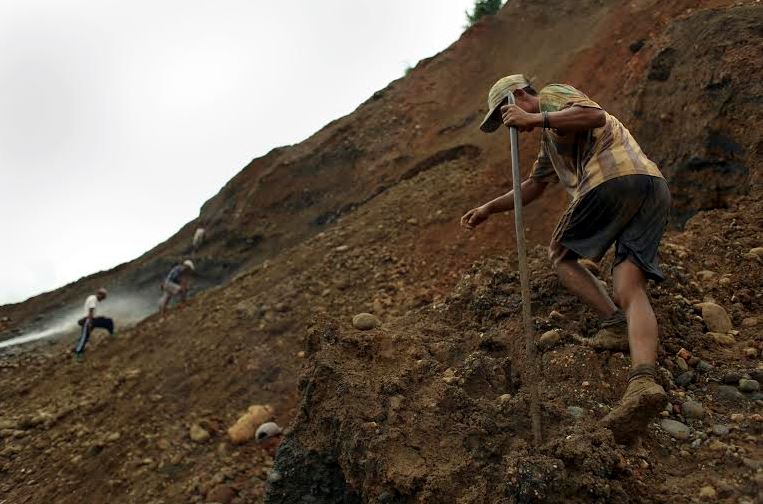
Natural Resource Charter Informs Multi-Stakeholder EITI Process as Myanmar Extractive Reform Begins
Myanmar’s citizens have the potential to benefit from the country’s endowments of oil, gas, and gems, but governance of these industries has been historically problematic and so many actors are pushing for change. Last month, NRGI staff began working with Extractive Industries Transparency Initiative (EITI) stakeholders in Myanmar on a new project that will use the Natural Resource Charter to help build consensus on priorities for extractive industries reform.

A man mines for jade in Myanmar’s Kachin state. (Credit: Minzayar for NRGI)
During events held with government officials in the national capital Naypyitaw and civil society and business leaders in Yangon, stakeholders involved in Myanmar’s fledgling EITI process have thought through the many challenges and opportunities presented by the extractive industries, using the lens of the charter framework. As the discussions continue, we hope that this charter benchmarking process can build consensus on a way forward for the sector between government, civil society and the private sector.
What is the Natural Resource Charter benchmarking framework?
The charter benchmarking framework is a customizable tool that countries can use to diagnose, assess and monitor the governance of oil, gas and mineral wealth. It takes the twelve guiding precepts of the Natural Resource Charter and reinterprets them as questions for self-analysis. It has been employed by governments, including in Tanzania, where a mixed stakeholder group working under the auspices of the head of the civil service is conducting a gas sector planning process; and Sierra Leone, where a multi-stakeholder group is using it in conjunction with the Africa Mining Vision to develop a new mining policy. In Nigeria, a group of non-governmental actors, chaired by a former petroleum minister are using the framework to monitor the government's management of the petroleum sector over time. The African Union Heads of State steering committee for NEPAD adopted the framework in 2012 as a flagship natural resource governance program. Several donor countries are also using it as an organizing and monitoring tool in their work.
Myanmar EITI stakeholders can also harness the program to help meet contextual reporting goals under the EITI standard. “Myanmar EITI has already been tackling numerous important and challenging discussions about disclosures on sector governance,” said our colleague, NRGI’s Myanmar officer Maw Htun Aung. “The Natural Resource Charter can serve as a useful tool to structure and advance those discussions. The two initiatives—the charter and EITI—can be mutually reinforcing.”
Extractive resources are already the country’s largest source of foreign income and their impact is likely to increase as new investors continue to pour money into the country. While revenues could finance sustained development gains, they are also subject to significant “resource curse” risks; these risks are what EITI stakeholders in the country are helping Myanmar to avoid.
EITI in Myanmar represents great hope as the first multi-stakeholder forum for discussions about extractives in the country. Under the initial coordination of the Myanmar Development Resource Institute (MDRI), now being transferring to the Ministry of Finance, engagement between government, civil society and the private sector has started. But in many cases progress and discussions are slow as the different stakeholders need to learn about the EITI process—and how to engage with each other for the first time.
Commenting on the experience of working with other partners, Ye Thein Oo of the Myanmar-China Pipeline Watch Committee said: “Different people are working on different issues around natural resources, but with little cooperation. But the charter principles will bring all these issues together in one discussion, and it will become a big advantage as we push forward for long-term policy reform.”
Looking ahead, NRGI and our research partner the Centre for Social Responsibility in Mining at Australia’s University of Queensland will consolidate inputs and analysis from local stakeholders, collected through these workshops and from additional interviews, into a findings report. Once it has been validated by the stakeholders, plans are in place to submit the findings report to the Myanmar EITI Multi-Stakeholder Group for its use before national elections scheduled for November this year.
Ko Ko Lwin is NRGI’s Myanmar associate. Rob Pitman is a governance officer with NRGI.
Authors

Robert Pitman
Senior Governance Officer
